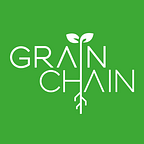Understanding Blockchain in Agriculture: Tracking Data in the Supply Chain
- Blockchain technology helps connect all participants along the agricultural supply chain through accurate, secure and transparent data.
- Blockchain’s real-world applications encompass much more than just cryptocurrency.
- GrainChain uses blockchain and smart contracts to improve efficiency, speed of payment and trust in the marketplace.
In today’s digital age, technology has revolutionized various industries, and agriculture is no exception. The agricultural supply chain is a complex web of activities involving farmers, producers, buyers, storage operators, processing plant operators, logistics companies, and many other participants. As this intricate system evolves, it becomes essential to track and manage data accurately and securely.
Enter blockchain technology, a powerful tool that offers immense advantages in tracking data for commodities as they move through the agricultural supply chain. In this blog, we will explore what blockchain is, how it works, and why GrainChain has embedded this technology into their solutions for the agricultural industry.
Understanding Blockchain: The Basics
Blockchain, often associated with cryptocurrencies like Bitcoin, is a decentralized and transparent digital ledger that records transactions across multiple computers. However, its potential extends far beyond digital currencies. At its core, blockchain is a system designed to store information in a way that ensures transparency, security, and immutability.
Imagine a chain of blocks, where each block represents a collection of data. These blocks are interconnected, forming a chronological sequence. Whenever a new transaction or piece of data arises, it is added to a block, which is then appended to the chain. Importantly, once data is recorded in a block, it cannot be altered or tampered with, thanks to the cryptographic principles that underpin blockchain technology.
Advantages of Blockchain in the Agricultural Supply Chain
1. Security and Immutability: The agricultural supply chain involves numerous stakeholders, each responsible for different stages of production and distribution. With traditional systems, data can be vulnerable to manipulation or fraud, leading to disputes, inefficiencies, and losses. Blockchain, on the other hand, provides a secure and immutable platform for recording data. Once data is entered into the blockchain, it cannot be changed retroactively without consensus from the network participants, ensuring trust and transparency throughout the supply chain.
2. Transparency and Traceability: One of the most significant advantages of blockchain technology is its ability to provide transparency and traceability. In the agricultural supply chain, consumers and stakeholders increasingly value information about the origin, quality, and sustainability of products. By using blockchain, every transaction and data point related to a commodity can be recorded and traced, allowing for complete visibility and accountability. From the farm to the consumer’s table, stakeholders can access real-time information about the journey of a product, ensuring its authenticity and quality.
3. Efficiency and Automation: Traditional record-keeping processes in the agricultural supply chain can be time-consuming and error-prone. Paper-based systems, manual data entry, and fragmented databases contribute to delays and inaccuracies. Blockchain streamlines these processes by providing a decentralized and shared database accessible to all authorized participants. Smart contracts, self-executing agreements embedded in the blockchain, enable automation of certain tasks, such as payments, certifications, and compliance checks. This automation reduces paperwork, eliminates intermediaries, and enhances efficiency across the supply chain.
4. Reduced Risks and Increased Trust: In a complex supply chain, various risks can arise, such as counterfeiting, contamination, or fraudulent practices. Blockchain mitigates these risks by establishing trust and ensuring data integrity. With its transparent and immutable nature, blockchain technology enables participants to verify the authenticity and accuracy of data, reducing the potential for errors, disputes, and fraud. By building trust among stakeholders, blockchain fosters collaboration, strengthens relationships, and improves the overall integrity of the agricultural supply chain.
How GrainChain Uses Blockchain To Solve Problems For All Participants Along the Supply Chain
GrainChain’s suite of products connect all supply chain participants to a single point of truth, built around a trusted transaction platform where blockchain-enabled data flows in from seed to market.
Blockchain technology allows us to use accurate, real-time data about commodities like corn, wheat, coffee and palm oil to automatically execute smart contracts as mentioned above.
This means that as soon as an agreed upon delivery is made, that data is recorded at the silo or processing plant and the smart contract can be executed. Lenders and insurers are paid back first, producers are paid quickly, and the buyer has the title to that delivery immediately. Traditionally this transaction would take weeks or months and involve tons of paperwork and manual labor. With GrainChain, the same transaction can be completed in a day.
For more information on GrainChain’s real world application of blockchain technology and the impact we make on the agricultural supply chain, visit https://www.grainchain.com.
